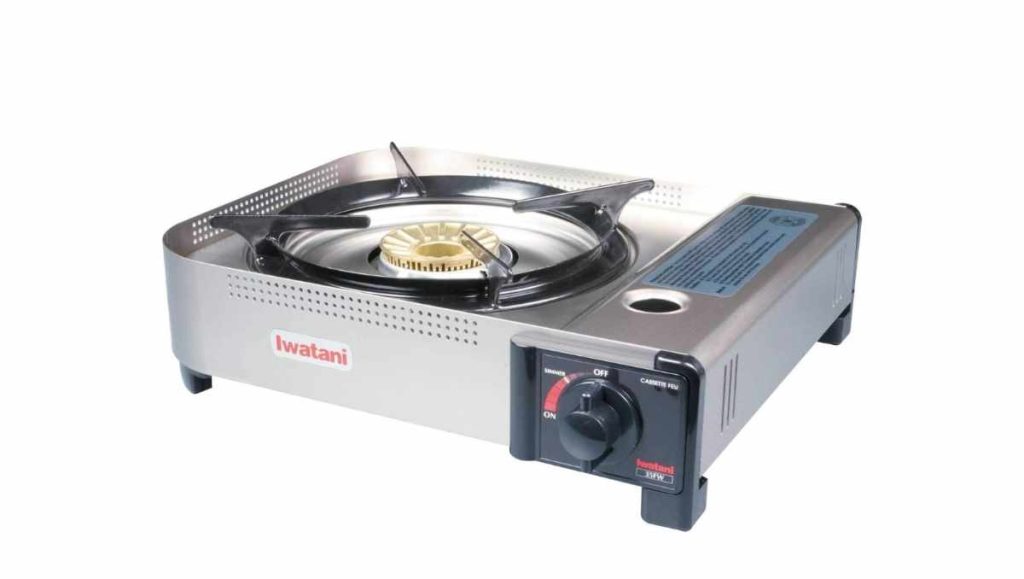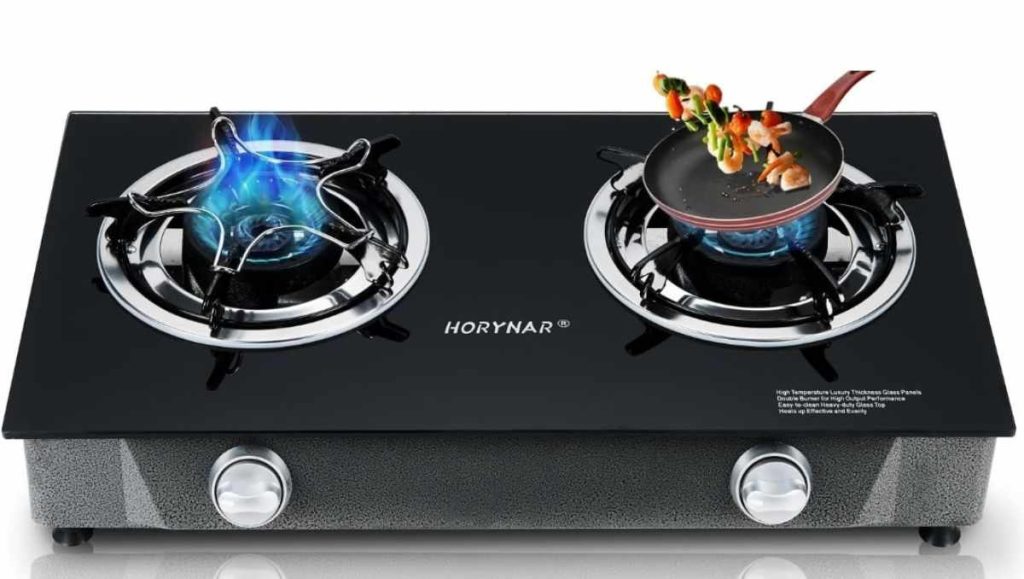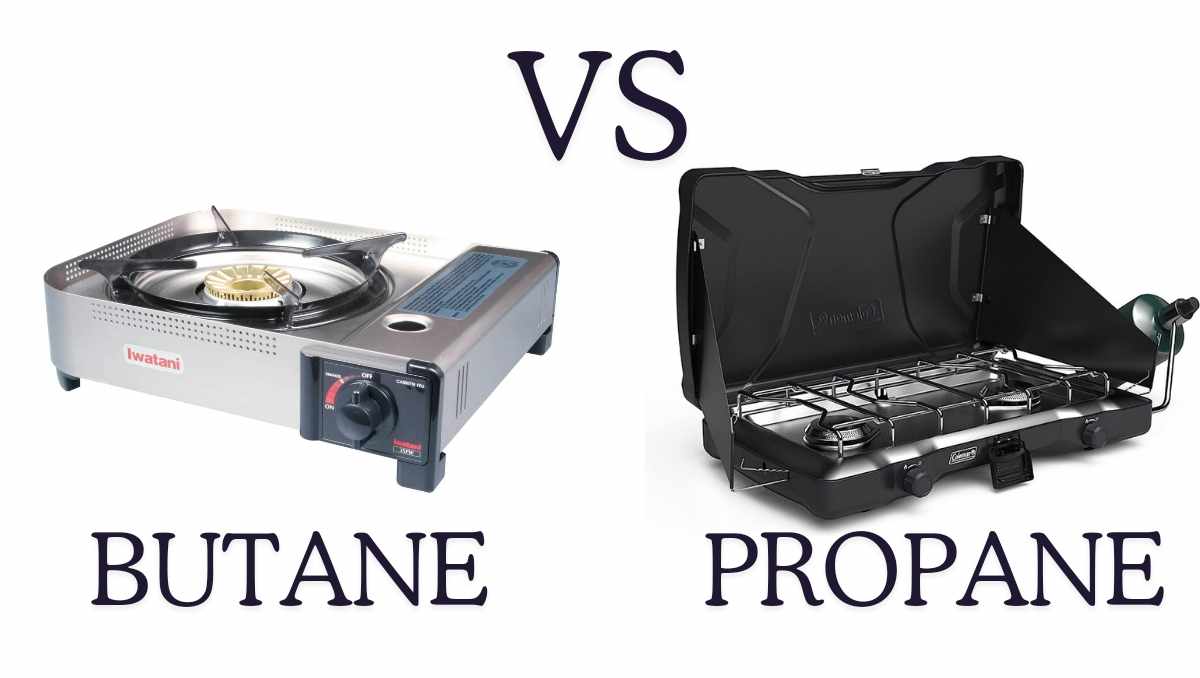This post contains affiliate links. See the affiliate disclaimer here.
When it comes to camping stoves, two of the most common fuel types are butane and propane. Both have their pros and cons and choosing the right one for your needs can be a challenge.
In this article, we’ll explore the differences between butane and propane stoves, their chemical and physical properties, safety and environmental impact, practical considerations, cost and availability, performance in different conditions, and maintenance and durability.

Butane and propane stoves are popular choices for outdoor cooking, each with its own set of advantages and ideal uses.
Butane is a highly flammable gas that is commonly used in portable stoves and lanterns. It’s easy to ignite and burns cleanly, making it a great choice for camping and backpacking.
Propane, on the other hand, is a heavier gas that requires more pressure to ignite. It’s also more expensive than butane and can be harder to find in some areas.
However, propane burns hotter than butane, making it a better choice for cooking in cold weather or at high altitudes.
When choosing between butane and propane stoves, it’s important to consider your specific needs and preferences.
Factors like the length of your trip, the weather conditions you’ll be facing, and the availability of fuel in your area can all play a role in your decision. By weighing the pros and cons of each option, you can make an informed choice that will help you enjoy your outdoor adventures to the fullest.
Key Takeaways
- Butane and propane stoves are popular choices for outdoor cooking, each with its own set of advantages and ideal uses.
- When choosing between butane and propane stoves, it’s important to consider your specific needs and preferences, as well as factors like the length of your trip, the weather conditions you’ll be facing, and the availability of fuel in your area.
- By weighing the pros and cons of each option, you can make an informed choice that will help you enjoy your outdoor adventures to the fullest.
Chemical Properties

Chemical Composition
Butane and propane are both hydrocarbon gases that are used as fuel sources for stoves. Butane has four carbon atoms and ten hydrogen atoms, while propane has three carbon atoms and eight hydrogen atoms. This difference in molecular structure affects the properties and behaviors of the two gases.
Energy Content
Propane has a higher energy content than butane, which means that it produces more heat per unit of volume. This makes it a better choice for high-demand applications, such as cooking large meals or boiling water quickly. Butane, on the other hand, has a lower energy content and is better suited for low-demand applications, such as simmering or warming food.
Boiling Points
Propane has a lower boiling point than butane, which means that it will vaporize and turn into a gas at a lower temperature. This makes it a better choice for colder temperatures, as it will continue to burn even when the temperature drops. Butane, on the other hand, has a higher boiling point and may not vaporize as readily in colder temperatures.
Overall, the choice between butane and propane will depend on your specific needs and the conditions in which you plan to use your stove. Consider the energy content, boiling points, and other factors when making your decision.
Physical Properties

When it comes to choosing between butane and propane stoves, understanding the physical properties of each fuel is essential. Here are some key factors to consider:
Storage and Transport
One significant difference between butane and propane is their storage and transport requirements. Butane is a liquid at room temperature and requires a lighter container, making it ideal for indoor storage. On the other hand, propane is a gas at room temperature and needs a thicker and heavier container. Therefore, propane can be safely stored outdoors.
When it comes to transport, butane is also more convenient as it is lighter than propane. However, it is essential to note that both fuels require careful handling and transport to avoid any accidents.
Temperature Tolerance
Another critical factor to consider is the temperature tolerance of each fuel. Propane has a higher energy density, and higher vapor pressure, and burns 1% hotter per lb than butane. It can also be burned at much colder temperatures, making it ideal for car camping during the winter months.
Butane, on the other hand, is not as effective in cold temperatures and may not burn efficiently. It is better suited for indoor use or backpacking during the warmer months.
In summary, when it comes to storage and transport, butane is more convenient, while propane is better suited for colder temperatures. Understanding these physical properties can help you choose the right fuel for your needs.
Safety and Environmental Impact

Flammability
Both butane and propane are highly flammable gases, and they should be handled with care. However, butane has a lower boiling point than propane, which makes it more likely to evaporate and catch fire. On the other hand, propane has a higher boiling point and is less likely to evaporate, which makes it safer to use in outdoor settings.
Toxicity
Butane and propane are also toxic gases that can cause harm if inhaled. However, both gases are generally safe to use in well-ventilated areas. It is important to follow the manufacturer’s instructions when using either gas to ensure proper ventilation and avoid any potential health risks.
Environmental Concerns
When it comes to environmental impact, propane is considered a cleaner-burning fuel compared to butane. Propane produces fewer greenhouse gas emissions and has a lower carbon footprint.
Additionally, propane is a byproduct of natural gas and crude oil production, which means it is a more sustainable fuel source compared to butane, which is typically produced from petroleum.
In terms of disposal, both butane and propane canisters can be recycled. However, it is important to properly dispose of any canisters that are not empty to avoid any safety hazards.
Overall, both butane and propane have their own safety and environmental considerations. It is important to weigh the pros and cons of each fuel source and choose the one that best suits your needs while also taking into account safety and environmental concerns.
Practical Considerations
Stove Compatibility
When choosing between butane and propane stoves, one practical consideration to keep in mind is stove compatibility. Butane stoves are designed to work with butane canisters, while propane stoves require propane canisters. It’s important to ensure that the stove you choose is compatible with the canisters you plan to use.
Burn Rate
Another practical consideration is the burn rate. Propane stoves have a higher burn rate than butane stoves, which means they can boil water and cook food faster. However, this also means that propane canisters will need to be replaced more frequently than butane canisters.
Heat Control
Heat control is another important consideration when choosing between butane and propane stoves.
Butane stoves tend to have better heat control than propane stoves, which makes them ideal for cooking more delicate dishes that require precise temperature control.
Propane stoves, on the other hand, are better suited for heavy-duty cooking tasks that require high heat and fast cooking times.
Overall, when choosing between butane and propane stoves, it’s important to consider your specific needs and preferences.
If you need a stove that can handle heavy-duty cooking tasks and don’t mind replacing canisters more frequently, then a propane stove might be the right choice for you. However, if you need a stove that offers better heat control and is ideal for cooking more delicate dishes, then a butane stove might be the better option.
Cost and Availability
Market Price
When it comes to the market price, propane stoves are generally more expensive than butane stoves. This is because propane is a more complex fuel to produce and transport than butane.
Additionally, propane stoves tend to be larger and more powerful than butane stoves, which can also contribute to their higher cost.
However, it is worth noting that the price difference between the two fuels is not always significant, and it can vary depending on the brand, model, and location of purchase.
Accessibility
In terms of accessibility, propane is generally more widely available than butane. This is because propane is used for a variety of purposes, including heating and cooking, and is therefore stocked by many more retailers.
Propane is also available in larger tanks, making it a more convenient option for those who plan to use their stove frequently or for extended periods.
On the other hand, butane can be harder to find in some areas, and may only be available in smaller canisters.
However, butane stoves are often more portable and lightweight than propane stoves, making them a popular choice for backpackers and hikers who need to carry their stoves with them.
In conclusion, both butane and propane stoves have their advantages and disadvantages when it comes to cost and availability.
When deciding which type of stove to purchase, it is important to consider your specific needs and preferences, as well as the availability and cost of fuel in your area.
Performance in Different Conditions
Altitude Effects
When it comes to cooking at high altitudes, propane stoves are usually the better choice.
This is because propane has a lower boiling point than butane, which means it can vaporize more easily at high altitudes. In contrast, butane has a higher boiling point and may not vaporize well at higher altitudes.
As a result, butane stoves may not perform as well at high elevations and may take longer to cook food.
Weather Influence
Propane stoves are generally better suited for colder weather conditions. This is because propane can function in colder temperatures than butane.
Propane stoves can operate in temperatures as low as -43 degrees Fahrenheit, while butane stoves may not work as well in colder weather conditions.
However, if you are cooking in warm weather conditions, both propane and butane stoves will perform well.
In summary, when choosing between a butane and propane stove, it’s important to consider the conditions you will be cooking in. If you plan to cook at high altitudes or in colder weather conditions, a propane stove may be the better choice. However, if you plan to cook in warmer weather conditions, both propane and butane stoves will perform well.
Maintenance and Durability
Cleaning Requirements
When it comes to cleaning, both butane and propane stoves require regular maintenance to ensure their longevity. However, the cleaning requirements for each type of stove can vary.
Butane stoves generally have a simpler design, which makes them easier to clean. They often have fewer parts and a smaller burner assembly, which means there are fewer areas for dirt and debris to accumulate. You can easily clean a butane stove by wiping it down with a damp cloth and mild detergent.
Propane stoves, on the other hand, tend to have more complex designs with more parts, which can make them more difficult to clean.
The larger burner assembly and fuel canister also mean that there are more areas for dirt and debris to accumulate. For this reason, propane stoves may require more frequent and thorough cleaning.
Lifespan
When it comes to lifespan, both butane and propane stoves can last for many years with proper care and maintenance. However, there are a few factors that can affect the lifespan of each type of stove.
Butane stoves typically have a shorter lifespan than propane stoves. This is because butane is a more volatile fuel than propane, which can cause more wear and tear on the stove over time.
Additionally, butane stoves tend to have smaller fuel canisters, which means that they may need to be replaced more frequently.
Propane stoves, on the other hand, tend to have a longer lifespan than butane stoves. Propane is a more stable fuel than butane, which means that it is less likely to cause wear and tear on the stove.
Additionally, propane stoves often have larger fuel canisters, which means that they can last longer between refills.
Overall, both butane and propane stoves can be durable and long-lasting appliances if they are properly maintained. However, if you are looking for a stove that will last for many years with minimal maintenance, a propane stove may be the better choice.
Frequently Asked Questions
What are the safety differences between butane and propane stoves?
Both butane and propane stoves are safe to use when used correctly. However, there are some safety differences between the two.
Butane has a lower boiling point than propane, so it is more likely to evaporate than propane. This means that butane is more likely to catch fire than propane. Additionally, butane is more soluble in water than propane, so it is more likely to be absorbed into the water if it is spilled.
Can you use butane in a stove designed for propane, and vice versa?
No, you should not use butane in a stove designed for propane, and vice versa. The two gases have different pressure requirements, and using the wrong gas can damage the stove and cause safety hazards.
What are the cost comparisons for using butane versus propane stoves?
The cost of using butane versus propane stoves can vary depending on several factors, including the cost of fuel, the size of the canisters, and the frequency of use. Generally, butane stoves are slightly cheaper than propane stoves, but the cost difference is not significant.
What are the pros and cons of using butane stoves for camping?
Butane stoves are a popular choice for camping due to their portability and ease of use. They are also relatively lightweight and compact, making them easy to pack and transport. However, butane stoves have a lower heat output than propane stoves, which can make cooking times longer. Additionally, butane canisters are not as widely available as propane canisters, which can be a disadvantage when camping in remote areas.
How do butane and propane stoves differ in terms of heat output?
Propane stoves generally have a higher heat output than butane stoves. This means that propane stoves can boil water and cook food faster than butane stoves. However, butane stoves are still capable of cooking food and boiling water, although it may take slightly longer.
Are there any specific disadvantages to using butane stoves indoors?
Butane stoves can be used indoors, but there are some specific disadvantages to be aware of. Butane stoves produce carbon monoxide and other harmful gases when they burn, which can be dangerous if the stove is used in a poorly ventilated area. Additionally, butane canisters can be difficult to find in some areas, which can be a disadvantage if you rely on the stove for cooking.

